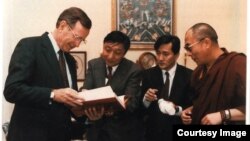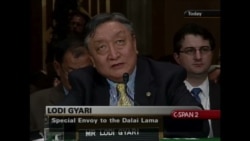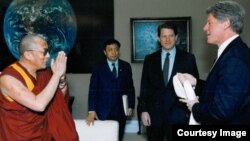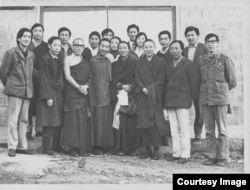Years after Lodi Gyaltsen Gyari fled Tibet for India with his parents, he learned the Chinese had killed his grandmother and elder brother who had remained, by torture and stabbing respectively. As an adult, he co-founded an influential Tibetan rights organization, relinquished the notion of armed resistance to embrace non-violent dispute resolution, and became the special envoy of the Dalai Lama in Washington, D.C.
Recognized as the reincarnation of Khenchen Jampal Dewe Nyima of Lumorap Monastery in Nyarong, Eastern Tibet, he died on Monday in San Francisco where he was undergoing treatment for liver cancer.
Better known as Gyari Rinpoche, he had the ear of world leaders and listened to the janitors who cleaned around him as he prepared to appear before the U.S. Congress.
Advocate for Tibetans
Described as "an impassioned advocate for the Tibetan people, universal human rights and global democratic reform," by the International Campaign for Tibet (ICT), the Tibetan government in exile held special prayers for Gyari Rinpoche at its seat in Dharamsala, India on October 30, a day after he died. A gathering is planned in San Francisco before his body is flown to Dharamsala for a funeral, people close to the family told the VOA Tibetan Service.
Lobsang Sangay, president of the Central Tibetan Administration, the Tibetan government in exile, called Gyari Rinpoche “a true Tibetan patriot” who dedicated “his entire life to serving Tibet and the Tibetan people. He was a trailblazer and leaves behind a lasting legacy of public service.”
“Lodi was my dear friend and partner and mentor for over 30 years,” said Richard Gere, the ICT board chairman and actor in a statement posted on the organization’s site. “He created a life of great meaning and sacrifice that will resonate for many generations — throughout the Tibetan and non-Tibetan world. He was extraordinary.”
U.S. House Minority Leader Nancy Pelosi, the San Francisco Democrat, issued a statement soon after the death of Gyari Rinpoche, crediting him with building “deep support for the Tibetan cause throughout America and around the world. Members of Congress on both sides of the aisle benefited from Lodi’s insight and wisdom.”
Envoy to Washington
The Dalai Lama appointed Gyari Rinpoche the special envoy in Washington in 1990. The envoy simultaneously served as ICT president.
Gyari Rinpoche used the two positions to draw attention to the Tibetan cause. In the United States, “as a direct result of his advocacy work, the 2002 Tibet Policy Act institutionalized support for His Holiness the Dalai Lama and the Tibetan people’s right to self-determination,” said a statement by the Unrepresented Nations and Peoples Organization, which Gyari Rinpoche co-founded. “Part of this support came in the form of over $185 million in funds for Tibetans and the Tibetan government in exile, set aside for the purpose between 1991 and 2011.
WATCH: Lodi Gyari Testifying Before Senate Foreign Relations Committee in 2008
He oversaw the ICT’s growth from fewer than 1,000 members to more than 75,000 with a multimillion-dollar budget. After his tenure as ICT president ended, he became executive chairman of the ICT board, a position he held till 2014.
When Gyari Rinpoche retired as special envoy in 2012, the U.S. Senate passed a resolution that commended “the achievements of Lodi Gyaltsen Gyari in building an international coalition of support for Tibet that recognizes, (A) the imperative to preserve the distinct culture and religious traditions of Tibet; and (B) that the Tibetan people are entitled under international law to their own identity and dignity and genuine autonomy within the People’s Republic of China that fully preserves the rights and dignity of the Tibetan people.”
Born into influential family
Gyari Rinpoche was born in 1949 into an influential family in Nyarong, Eastern Tibet. When China invaded and occupied Tibet after an uprising in 1959, he escaped to India with his family, an epic trek made with thousands of other Tibetan refugees.
In India, he continued his monastic Buddhist study with both Tibetan and Indian Buddhist masters, “whose eminent positions often placed them in contact with their peoples’ respective self-determination movements,” according to an obituary published by the Unrepresented Nations and Peoples Organization, an organization he co-founded. “The combination of the two would prove a fundamental influence on his path in life.”
Armed resistance to ‘Middle Way’
An advocate of armed resistance, Gyari was selected to be educated as a translator for the resistance fighters being trained in the United States.
Instead, he used English to edit the first English-language Tibetan publication, which is now the Tibetan Review, a position that drew him into the politics of Tibet’s government in exile. This exposure sparked his evolution into a proponent of nonviolent conflict resolution, and he became one of the key supporters of the Dalai Lama’s “Middle Way” policy.
In 1970, Gyari Rinpoche co-founded the Tibetan Youth Congress, which today is one of the largest Tibetan political organizations outside of Tibet.
In May 1998, the Dalai Lama appointed Gyari Rinpoche to initiate and lead a dialogue with the People’s Republic of China. Between 2002 and 2010, Gyari Rinpoche conducted nine rounds of high-level talks in China and elsewhere, according to the ICT. “He also led a behind-the-scenes diplomatic effort to sustain the process, expand the channels of communication, build trust with the Chinese leadership and maintain a broad international interest in the dialogue process,” the ICT said.
Gyari Rinpoche also worked on anti-poverty initiatives throughout the Himalayas and Southeast Asia. He co-founded Kreddha, the International Peace Council for States, Peoples and Minorities, with the late Don Rodrigo Carazo, former president of Costa Rica, and others.
The Allied Committee
He was one of the co-founders of the Allied Committee, an organization that advanced the common issues faced by the Tibetans, Uyghurs and Mongolians under Chinese rule. This led Gyari Rinpoche to co-found UNPO, a worldwide organization established before the break-up of the Soviet Union to promote the rights of peoples and minorities through democracy and nonviolence.
He is survived by his wife Dawa Chokyi, who performed with the Tibetan Institute of Cultural Arts, when the couple met in Dharamsala, according to a family acquaintance. The couple had six children and grandchildren.

















